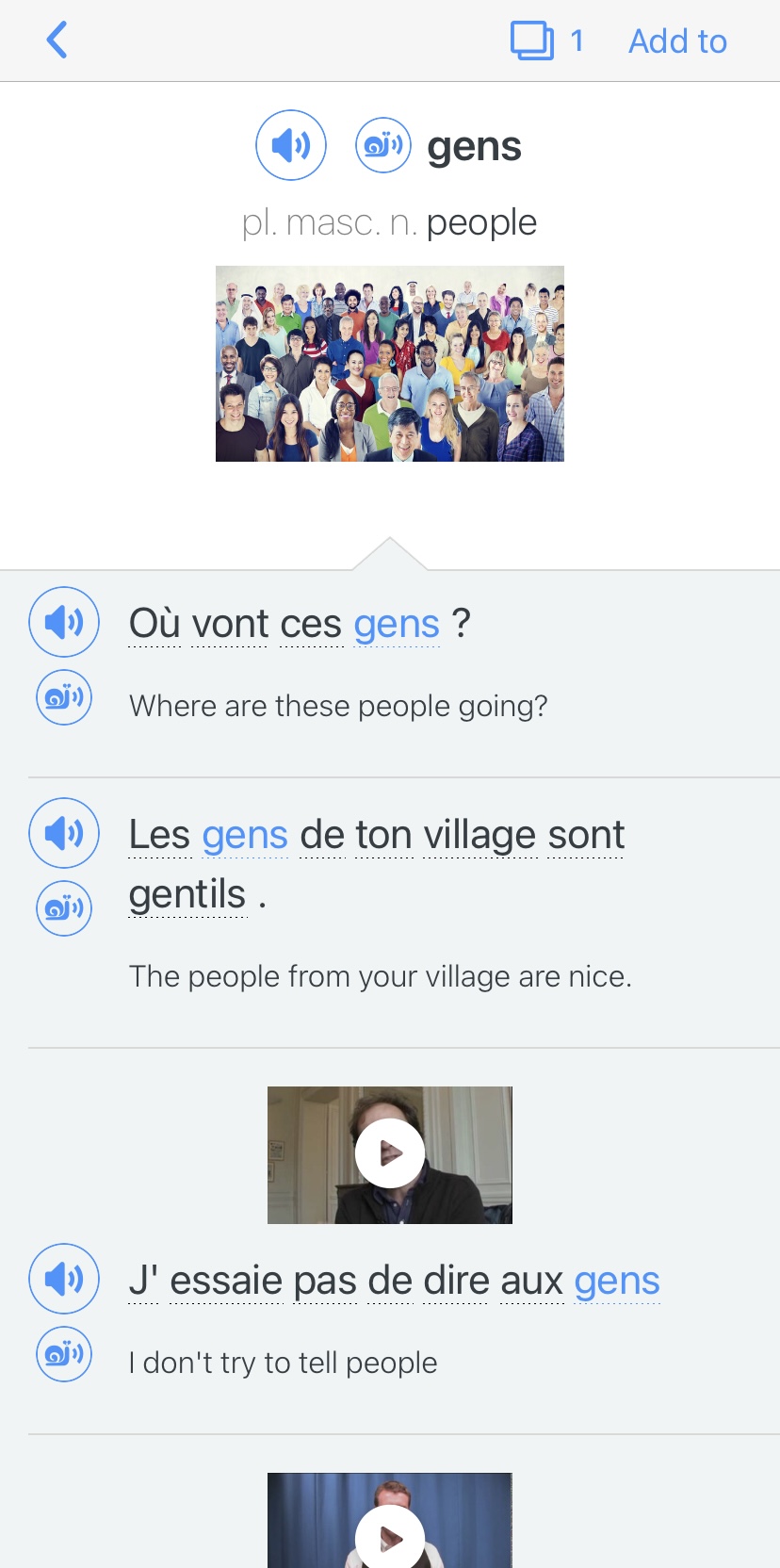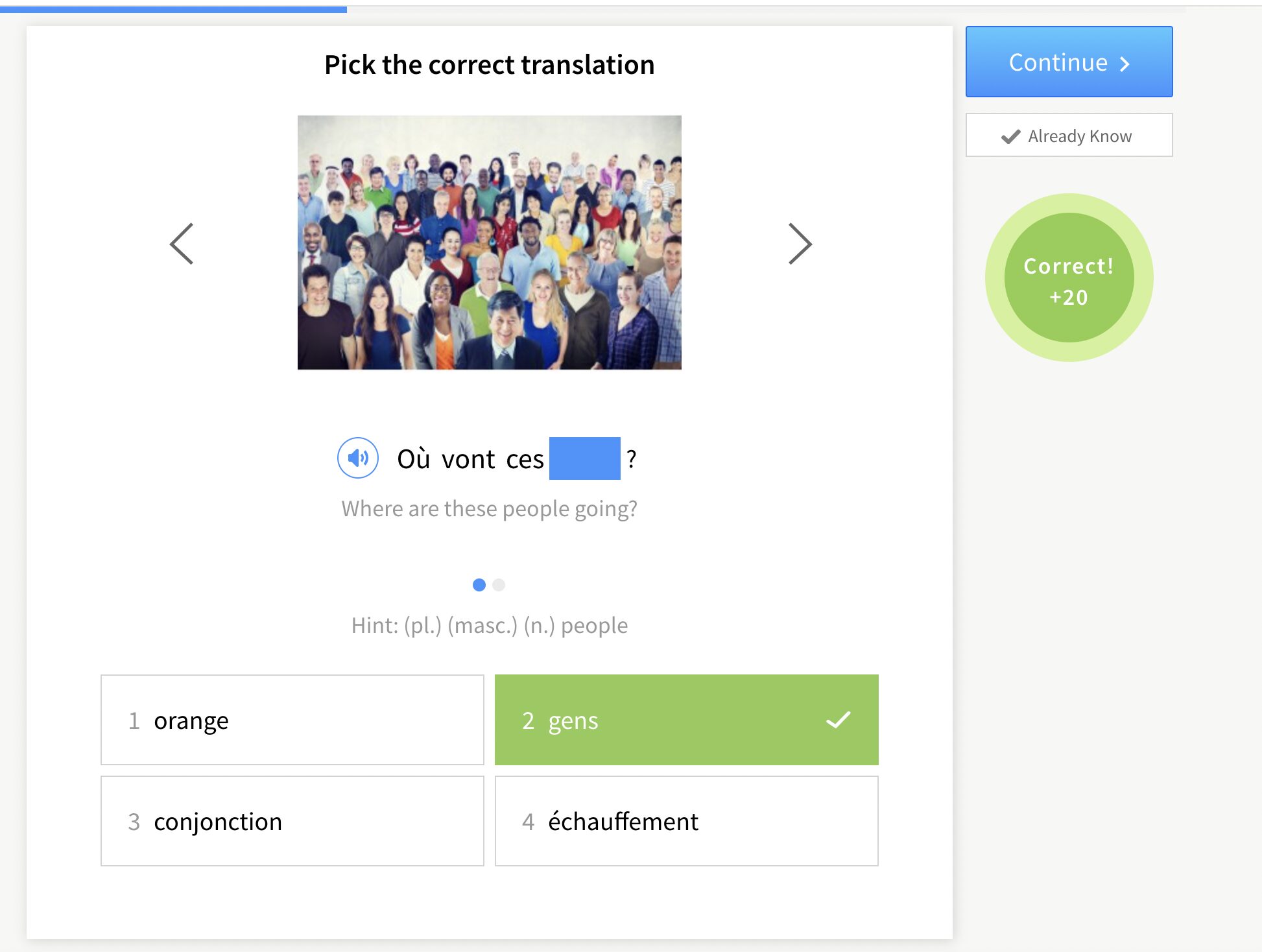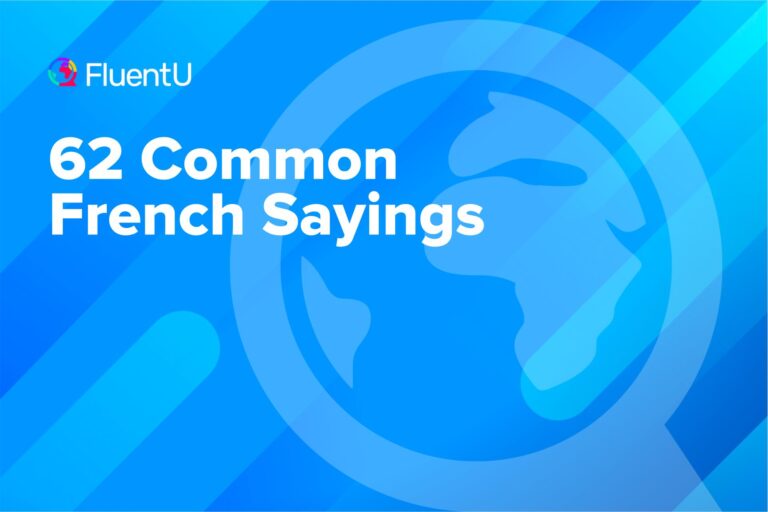Contents
- 1. Consume a Lot of French Content
- 2. Do French Exercises or Quizzes
- 3. Use French Flashcard Apps (or Make Your Own Flashcards)
- 5. Take French Dictations with Songs
- 6. Practice Writing in French
- 7. Keep Up with the News
- 8. Scroll Your Way Through French Social Media
- 9. Play Games to Strengthen Your French the Fun Way
- 10. Speak French with a Friend or Learning Partner
- 11. Read French Literature
- 12. Take a Self-guided French Course
- 13. Immerse Yourself in French (at Home)
- 14. Talk to Yourself in French
- 15. Shadow French Speakers
- 16. Set a Regular Schedule for Learning French
- 17. Set SMART Learning Goals, Too
- And One More Thing…
17 Best Ways to Learn French on Your Own

Wondering what the best way to learn French by yourself is? There isn’t actually one best way, as “best” depends on your own personal needs.
Start with trying out some of these ideas on how to learn French at home. You’ll find that, as long as you know how to apply them effectively, these tips can successfully take you to fluency.
Download: This blog post is available as a convenient and portable PDF that you can take anywhere. Click here to get a copy. (Download)
1. Consume a Lot of French Content
Learning French from authentic content is incredibly effective, as it allows you to see how the language is used naturally by French speakers.
You can:
- Kick back in front of the TV
- Watch a movie
- Listen to podcasts (if you’re a beginner, you can pick the ones with transcripts)
- Listen to audiobooks (again, if you’re a beginner, reading along with the corresponding text might help)
- Laugh out loud via the articles on Topito, France’s answer to Buzzfeed
Together, these resources expose you to a lot of new words that you might not come across in daily speech, and train both your listening and reading skills at the same time.
Pay attention to the French words, grammar and pronunciation, and be sure to note anything you don’t recognize so you can study it later.
For videos, you can mix up your learning by watching a French show with English subtitles, French subtitles or no subtitles at all on platforms like Netflix, YouTube and FluentU. FluentU lets you learn with authentic videos, by turning any YouTube or Netflix video into a language-learning lesson.
FluentU takes authentic videos—like music videos, movie trailers, news and inspiring talks—and turns them into personalized language learning lessons.
You can try FluentU for free for 2 weeks. Check out the website or download the iOS app or Android app.
P.S. Click here to take advantage of our current sale! (Expires at the end of this month.)
Here’s a video from the FluentU French YouTube channel that demonstrates how you can learn with clips from “Les Simpsons”:
2. Do French Exercises or Quizzes
French exercises and quizzes are a great way to test your knowledge and practice grammar and vocabulary.
Granted, they might remind you of the teachers who made it crystal-clear what they thought of your French mastery (or lack thereof) with blood-red marks on your papers, but don’t knock on this useful practice tool.
For example:
- Interactive French exercises can be done online. The best part is that most of them are free!
- French textbooks usually have answers in the back. If you’re lucky, they may also have explanations as to why those answers are correct. For example, the French “Practice Makes Perfect” books from McGraw-Hill offer simple, guided exercises. They even come with an app you can download to your iOS or Android device to supplement your learning via audio and flashcards.
Speaking of flashcards…
3. Use French Flashcard Apps (or Make Your Own Flashcards)
French flashcard apps are particularly effective for picking up vocabulary and mastering all those confusing irregular verb conjugations. The key is to make use of a Spaced Repetition System (SRS) to truly make new vocabulary stick, as indicated in the video from our YouTube channel below:
If you have a lot of free time on your hands or you prefer to make your own flashcards, you can also do the following for each type of flashcard.
Vocabulary flashcards
- Identify the French words that you use the most. Flashcards with words for food items, directions and shopping might be infinitely more useful to you than, say, medical vocabulary.
- Write the French word on one side. Then, on the other side, write the English translation and/or French definition. You can also include an image or example sentence.
- Always include the grammatical gender with a definite or indefinite article ( le / la — the; un / une — a). Since these words can’t be separated from their genders, it’s always better to practice both at the same time.
Verb flashcards
- Write the infinitive of the verb on one side along with the tense you want to practice. On the other side, write the conjugation.
- Be sure to include a subject pronoun. As with the genders of nouns, conjugated verbs in the French language can’t be separated from their subject pronouns. It’s always better to practice both together.
5. Take French Dictations with Songs
Listening to songs and writing down their lyrics helps you practice your listening skills in a fun way. Disney songs and other familiar English-language originals are especially handy for this since you already know what they’re about so you can focus on the grammar and linguistic nuances in the French versions.
If you don’t believe me, the dictée (dictation) is actually a common exercise for young French children in elementary school. It involves copying down what the teacher reads aloud, ensuring that students master spelling, verb conjugation and adjective agreement.
The goal of dictée is to teach students how to write in French correctly. So, it can be just as effective for learning French as a second language.
As a French learner, here’s how you can do your own version of the dictée:
- Copy down everything you hear. Then, get your hands on a copy of the lyrics and see how you did.
- If you’re a beginner, you might want to start these dictées by just filling in the blanks. Print out a copy of the song lyrics, and blank out words or phrases using correction fluid. Then, try to fill them back in while listening to the song. You can also do this exercise using an app like LingoClip, which essentially does the same thing—minus the paper and correction fluid, of course.
- As you get more advanced, you can try to write down the lyrics from scratch. Then, translate them into English.
You don’t have to stick to songs, though. You can do this exercise with pretty much any audio material that has transcripts.
6. Practice Writing in French
Once you’re comfortable enough with reading in French, you can try applying what you’ve learned by writing in French like so:
- Practice one grammar point or type of vocabulary at a time. For example, you can practice the simple future, the different uses of the conditional or some of the coolest French words you know.
- Write a paragraph or page illustrating the grammar point/vocabulary you’re working with. Do this without looking at your book or notes.
- Check your work for errors. The best way to learn French using this method is to hire a tutor. But if you can’t do that for one reason or another, you can also refer to your textbook, run your work through French grammar checkers like BonPatron or post your work on forums like /r/French and HiNative. (You can read more about how HiNative works in this review.)
- Make your own writing exercises. Not only will it be more fun for you to choose your own exercise topic, but you can also ensure that the topic is more applicable to your learning goals.
- Try freewriting. The options for freewriting exercises are limitless! They can include diary entries, news reports, letters and even fictional stories.
7. Keep Up with the News
Not only will consuming French news keep you abreast on what’s happening in the Francophone world, but you can also practice your reading and/or listening skills depending on the type of media you’re using.
Here are my recommendations for:
French audio news
- News in Slow French. These are essentially podcasts consisting of slowly spoken news stories in simple French. With a subscription, you can access a full French transcript, as well as a PDF with translations and flashcards.
- Géopolitique (Geopolitics). Part of the Radio France network, Géopolitique consists of international news in bite-sized chunks.
French written news for beginners
- 1jour1actu. This is a written publication aimed at younger readers, meaning it has easy-to-understand articles with lots of colorful pictures.
- Mary Glasgow. Like 1jour1actu, this one is also written for children. While the full magazine requires a subscription, it’s possible to access a few articles for free.
French written news for advanced learners
- Le Monde (The World). True to its name, Le Monde covers international news in French.
- Le Parisien (The Parisian). Le Parisien , on the other hand, features a ton of articles on Paris, though it also touches on national and international matters.
French video/TV news
- France 24. France 24 covers international news and streams their live coverage in French here.
- Euronews. Similarly, you can watch the French version of Euronews’ live broadcasts here.
If you’re looking for active forums to discuss these French news, you can also head over to /r/France. Keep in mind that this forum is entirely in French!
To get the most out of the news, try writing summaries of the stories you read or hear, and don’t forget to take note of any unfamiliar vocabulary or grammar.
8. Scroll Your Way Through French Social Media
If you’re like most people, you probably already spend lots of time scrolling through social media. So, why not make that scrolling more French?
For example, you can check out these YouTube channels:
- Learn French with Alexa. No, this isn’t the French YouTube channel of our favorite Amazon assistant. Rather, it’s run by a woman whose bio boldly claims that she’s “YouTube’s most awesome French teacher.” And honestly, it’s hard to argue with that!
- Learn French with Vincent. This is another YouTube channel that offers grammatical tutorials, vocabulary explanations and easy dialogues in French.
- FrenchPod101. For YouTube channels linked to smartphone apps, I recommend this one. It’s a multi-faceted online French learning program for all levels of French. We’ve also reviewed the app here, so you can decide if it’s right for you.
- Lingoni French. This one is also based on an app that focuses on listening comprehension and interactive exercises.
You can treat these YouTube channels like real French classes. Take notes, engage in the comment sections (in French) and do any exercises or activities that the YouTubers suggest for practice.
Aside from keeping up with the latest on YouTube, you can also change your language settings on pretty much any social media platform and instantly start exposing yourself to more French. Once you change your language, you’ll start seeing lots of recommendations for French posts and content. I also recommend following the #French or #français hashtag on your socials for great French-language posts.
9. Play Games to Strengthen Your French the Fun Way
At the end of a long day at work or school, playing games is a fun way to relax—and get some French learning in!
Luckily, there are plenty of websites and apps that teach the French language in a game-like format like:
- Duolingo. This one turns French learning into a fun experience through mini-games, levels and learning streaks. (And yes, we have a review for it, too.)
- Digital Dialects. I recommend this one for visual learners in particular, because the images look great—not to mention educational. You also have the option to play the games with audio, which is cool if you learn best by listening.
- French-Games.net. Each game on this site takes four steps to complete: (1) choose a topic, (2) study the lesson, (3) play any of the games connected to the lesson and (4) test yourself on any of the over 100 French topics on the website.
- Jeux Sam Amuse (lit. Sam Amuse Games). Like the other sites already mentioned, this has games that are perfect for beginners looking to practice common vocabulary topics or grammar constructions such as verb conjugations.
- ICI Radio-Canada.ca Jeunesse (ICI Radio-Canada.ca Youth). Developed by the Canadian Broadcasting Corporation (CBC), this website has games that are geared toward children who speak Canadian or Québécois French. (For example, you can solve a crime mystery.) I recommend these games for intermediate learners.
If you’re a serious gamer, I recommend playing your game of choice in French. Simply change your language setting to French, and voilà (there you go)! You can also play online games with actual native French speakers by checking out French-language Discord groups.
10. Speak French with a Friend or Learning Partner
To properly develop your French skills, you need to practice conversations with native speakers.
If you don’t know any French speakers personally, there are plenty of ways you can get in touch with a language learning partner:
- Travel to a French-speaking place. Plan a trip to France or another French-speaking country, and start chatting with the locals.
- Find French-owned establishments in your area. If you know of any places owned by French people or French speakers nearby, start checking those out.
- Check out French-language Meetup groups or events, too. As you can see here, many Meetup groups come together regularly to speak or practice French.
- Find a language exchange partner. Websites like MyLanguageExchange and italki specialize in connecting French learners with native French speakers. (You can find out more about italki in particular here.) Once you find a language partner, you can practice conversations with them and be instantly corrected and given feedback.
11. Read French Literature
Reading is one of the four major language skills—and luckily, France has great literature in spades.
If you’re into classic books, you can dig into:
- “Les Misérables” by Victor Hugo. Even if you’re not a French learner, you’ve probably heard of this timeless tale about inequality in 19th century France thanks to its many adaptations.
- “Le Comte de Monte Cristo” (The Count of Monte Cristo) by Alexandre Dumas. Like “Les Misérables,” “Le Comte de Monte Cristo” is also a famous work that’s benefited from countless adaptations. Unlike “Les Misérables,” this one is mostly about revenge, but there’s a bit of redemption thrown in there, too.
- “L’étranger” (The Stranger) by Albert Camus. This one is a true crime novel, told from the point of view of a man who commits murder.
If the classics aren’t really your thing, there are plenty of contemporary French books that may be more up your alley.
In any case, a great place to find these books is your local used bookstore.
Whatever you choose to read, here are some tips to make the most out of your reading session:
- Keep a French dictionary and notebook nearby. As you come across words you don’t know in French, write them down. I don’t recommend writing down every single unknown French word. Rather, you should only mine for the ones that you see most often or ones that are vital to understanding a particular section.
- Alternatively, use a reader with a built-in dictionary feature. Kindle and Kobo, for example, give you the ability to tap on any unknown word and instantly draw up its meaning.
- Use the new words actively. This could mean creating sentences for context, recordings of you saying these words aloud or creating flashcards.
12. Take a Self-guided French Course
Self-guided French courses can give you a bit more structure in your learning while allowing you to take things at your own pace. They can also give you more opportunities to speak, listen to, read and write the French language at a level that’ll be most useful for your current skills.
Here are some great online French courses you can look into:
- ielanguages.com. This has French tutorials that span six levels and cover topics such as verb tenses, lists of common vocabulary and even advanced topics such as the subjunctive mood.
- ToLearnFrench. This has lessons structured around the progression of learning French skills and includes videos and audio recordings, reading and listening comprehension activities and more.
- TV5Monde (TV5World). This one covers the same ground as ToLearnFrench—and is affiliated with a major news channel to boot!
- Lingoda. This is an online language school that specializes in teaching you French at any time of the day. It has hundreds of small French classes offered by native speakers.
- MOOCs (Massive Open Online Courses). These are high-quality offerings from universities around the world, often completely for free. They’re usually structured like traditional courses with lectures, interactive exercises and (on occasion) on-call teachers or tutors.
13. Immerse Yourself in French (at Home)
If you’re truly serious about mastering French, you may want to take it a step further and basically live and breathe the language.
By practicing parts of French culture yourself, you can passively practice your French skills as well.
Of course, it’s not always practical to move to a French-speaking region to immerse yourself in the language (though that’s definitely the most ideal option). Instead, you can add a French element to everything you do.
We’ve already touched on consuming as much French content as you can earlier. Aside from that, you can also:
- Cook French recipes written entirely in French and pick up related vocabulary.
- Dress in a French style and practice vocabulary related to clothes.
- Do DIY projects (arts, crafts, home renovations, etc.) using French step-by-step tutorials on YouTube or any other French website that hosts these tutorials.
The possibilities are endless when it comes to immersing yourself in French. Let your imagination take over, and find yourself with a ton of ideas to learn French without taking a single step outside your house!
14. Talk to Yourself in French
You might not always have opportunities to speak French with others.
In that case, create your own opportunities. Pour yourself a glass of wine. Talk about whatever’s on your mind. Feeling a little silly is a small price to pay for fluency.
Talking to yourself in French serves two purposes:
- To gain experience speaking the language. By talking to yourself, you begin to appreciate the feel of the words in your mouth.
- To learn how to think and organize your thoughts in French. This makes practical use of your existing knowledge and shows you where you need to fill in the gaps.
15. Shadow French Speakers
If you already use audio programs where speakers demonstrate a phrase and pause while you repeat (like Pimsleur, which we’ve reviewed here), using them as prescribed will probably help a lot.
But here’s something that I’ve found works even better: As soon as the person starts talking, start talking along with them. Ideally, you’ll want to speak almost simultaneously, but realistically you’ll probably wind up a little behind. This process is called “shadowing.”
By shadowing a French speaker, you can grasp more of their accent and be better at imitating it. From there, it’s easier to reach a point where the imitation becomes automatic.
It might feel weird when you first try it, but it’s a skill that can be learned. The end goal is to start speaking the language more naturally and automatically, with less thinking time involved. You can even try walking while you shadow—apparently, that’s great for improving your ability to learn and your brain health in general!
16. Set a Regular Schedule for Learning French
Even if you’re the type who likes to fly by the seat of your pants, scheduling some things (like learning French, for example) can benefit you.
When you consistently study French at, say, 8 PM every day, the habit becomes automatic. In other words, you’ll eventually get to a point where you no longer need look at a clock and think, “Oh yeah, I need to do another round of flashcards tonight.” Your brain just goes into “study French” mode at that time every time, because your body (clock) has gotten used to it.
Since we’ve established that having a routine is important, it’s worth some time and effort to develop a routine that works for you. I can’t advise you to, say, study in the morning if you’re more of a night owl. Figure out which time of day is the most conducive to your French studies. This will take a bit of time to figure out, of course, but that extra effort is worth it.
17. Set SMART Learning Goals, Too
When you’re setting goals, you want them to be SMART: Specific, Measurable, Achievable, Relevant and Time-bound.
Rather than shooting for a vague goal like “I want to become fluent in French,” ask yourself questions like:
- Why do I want to be fluent? Knowing your “why” will allow you to create a goal that will motivate you. For example, you might want to be able to read a particular book in French that’s impossible to get through at the moment. Or you might want to watch a particular film without annoying subtitles.
- By when should I achieve this goal? Let’s say you want to be able to communicate with your French in-laws whom you’ll be visiting in three months. So your goal can be something like “I want to learn how to talk about family in French within three months.”
- How can I achieve this goal? What are the steps you need to take to reach your goal? (Hint: We’ve outlined some ideas above.)
- What are the things that get in the way of me achieving my goal? For example, if you live in a noisy household, reading exercises might be more viable than listening activities.
If you’re still stuck, we have an entire post on how to set and achieve language learning goals in general.
Learning French becomes easier when you take advantage of the resources that are all around you.
Use this list of ideas for how to learn French by yourself as a jumping-off point. The sky’s the limit!
Download: This blog post is available as a convenient and portable PDF that you can take anywhere. Click here to get a copy. (Download)
And One More Thing…
If you’re like me and prefer learning French on your own time, from the comfort of your smart device, I’ve got something you’ll love.
With FluentU’s Chrome Extension, you can turn any YouTube or Netflix video with subtitles into an interactive language lesson. That means you can learn French from real-world content, just as native speakers actually use it.
You can even import your favorite YouTube videos into your FluentU account. If you’re not sure where to start, check out our curated library of videos that are handpicked for beginners and intermediate learners, as you can see here:
FluentU brings native French videos within reach. With interactive captions, you can hover over any word to see its meaning along with an image, audio pronunciation, and grammatical information.
Click on a word to see example sentences and other videos where it's used in different contexts, then add it to your flashcards. For example, if I tap on the word "gens," this is what pops up:
Want to make sure you remember what you've learned? We’ve got you covered. Each video comes with exercises to review and reinforce key vocab. You’ll get extra practice with tricky words and be reminded when it’s time to review so nothing slips through the cracks.
The best part? FluentU tracks everything you’re learning and uses that to create a personalized experience just for you. Start using the FluentU website on your computer or tablet or, better yet, download our app from the App Store or Google Play.
Click here to take advantage of our current sale! (Expires at the end of this month.)













